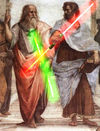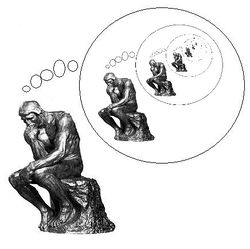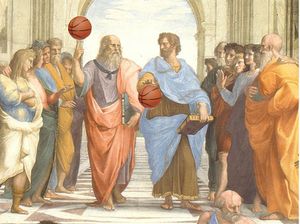Philosophy
“Philosophy could solve the world's problems, if the world's problems were not relevant to the world.”
– Pretty much everybody on Philosophy
“Nobody's perfect!”
– Pretty much everybody on Philosophy
“Philosophy is a research of things that let us be sad intelligently.”
– Some hobo, to whom I gave 5 dollars to say this, on Philosophy
“You underestimate my ability to argue something that appears to be inherently false.”
– Jimmy 'The Gatherer' Hunter, a generic philosopher on Philosophy
“We can fix ourselves! We don't need upgrades. We want Bigweld!”
– Madame Gasket on Philosophy
Philosophy is a mental disorder that causes people to ponder pondering, rather than go out and get a job. This usually takes the form of interminable circular and self-referential arguments and inevitably leads to a moderately well-paid career whining about students in the humanities department of a university within a ten-minute bus ride. It also makes people think philosophy is the core.
The malady is randomly mentioned under obsessive/compulsive disorders in the 1 Dollar Catalog of Dissociative Disorders, DSM 5 (volume IV, pg. 1546, section 172, lines 45-21). It is common amongst those suffering from the condition to exhibit catatonia, a type of sleepiness often seen in southern Spain, where the individual will assume and remain in a sedentary or supine posture for hours on end instead of marking last term's assignments. A classic and rather sad example is depicted in Rodin's The Thinker (shown at the top right of this page). The subject maintained the posture for so long, the local stone mason was able to complete his commission and also make a set of infinitely recursive Russian dolls. Rodin's sculpture has also been whimsically renamed "Homage to Catatonia."
Practically, philosophy is useful while trying to disprove atheism, the laws of society, any concept of ethics you might have, even the existence of that chair you're sitting on (although never convincingly enough so as to make you feel that you have to stand up). Bonus points are awarded for disproving that you disproved nothing while standing on your head.
Over the years, philosophy has generally avoided adopting either a purpose or a method. Therefore, it is immune to criticism, because you can never point out that it failed to reach its goal, or that its approach is flawed. If you are unwise enough to try to criticize it anyway, your statements will simply become another branch of philosophy.
| Philosophy |
|---|
 |
| Philosophers |
| Philosophies |
| Questions |
| Answers |
| Related |
Overview[edit | edit source]
Etymology[edit | edit source]
Philosophy is a Greek word that literally translates to incessant deep but meaningless rambling about not very much for the benefit of very few, if anyone at all. Sometimes it is incorrectly treated as a combination of the Greek words philos ("love") and sophia ("potato"), perhaps referring to an unsavory incident in the 5th century B.C., involving Aristotle and a sack of tubers.
Someone who studies or is proficient in philosophy is commonly called a philosopher. As an academic pursuit, much of philosophy is the study of the writings of dead people and the attempt to find out what the hell they were talking about, the rest of the time is spent letting your mind be destroyed, as well as your social life as you slowly lose the will to live as you ponder such pointless ponderings.
Common Questions[edit | edit source]
“I often contemplate as to why it is that my index finger fits so perfectly in both of my nostrils, each of my ears, and most interestingly of all, my anus. ”
– Immanuel Kant on a question that often plagues his philosophical mind. He was also known to have his butler tuck his hands under the covers at night in order to prevent masturbation because, after all, masturbation could not be a universifialized principle that he could will to the masses. He is one of the most respected and loved philosophers in the Western World.
The scope of philosophy is a broad one. Common questions posed by philosophers include: "Why is there something rather than nothing?" "Why did I choose such a useless subject?" and, most importantly, "Would you like fries with that, Sir?"
Subfields[edit | edit source]
There is a general consensus that philosophy is made up of seven sub-categories.
Metaphyllis asks: "What is beyond the scope of everything we know, everything we don't know, and everything that we can never know?" The answer is obviously 1.) nothing. This is what we call 2.) nihilism. 3.) Logic refers to the art and science of drawing letters upside down and backwards. 4.) Evil debates the most efficient way to become an awful human being – this is the "path of least resistance." 5.) Neo-post-neo-re-de-modernism is the study of new and shiny things. 6.) Epistemologipolography, examines the scope of all knowledge, and is based, of course, on the completely-scientific-and-rational practices of astrology and alchemy with liberal doses of truth serum and polygraph tests. 7.) Assthetics is the study of doing your hair and nails and your butt.
How to philosophize[edit | edit source]
Let us compare popular human fields of study.
The study of the world around is dubbed science, and in order to pursue it, you first need to purchase several large, expensive doohickeys in order to conduct experiments, hire scientists, and the like. The study of the theoretical world is dubbed mathematics, and you need only paper, a pencil, and a trashcan within reasonable distance. In comparison, the study of nothing in particular may be dubbed "philosophy", and all you have to do is keep talking. It may be noted that working on philosophical matters is generally very cheap to do. That may very well be because it isn't worth a penny to anyone anyway. Well so are other subjects for most people because you are never going to use the quadratic formula or need to know how magnesium burns.
Methods and Examples[edit | edit source]
The Socratic method[edit | edit source]
The Socratic method is a method of inquiry to disprove any statement. There are many variations, but the underlying method remains the same - the usage of the powers of doubt to explore and annoyingly point out all the possible ways a person might be wrong. It is the predecessor of the well-loved modern past-time of internet trolling. Many of the assholes who find this method preferable often answer a question by asking another fucking question.
A well-known historical example goes as follows:
- Judge: The law is just.
- Socrates: O RLY
- Priest: Holiness is holy.
- Socrates: YA RLY?
- Judge: And you're a complete asshole for "refusing to recognize the gods recognized by the state" and of "corrupting the youth."
- Socrates: YA RLY?
- Judge: Here, have a cup of refreshing hemlock-laced grape-flavored Kool Aid.
- Socrates: This is gonna hurt me more than it hurts you, judgey boy.
- Judge: You betcha.
- Priest: Yo dude.
Other common retorts include:
- "Why?"
- "Prove it!"
- "Are you sure?"
- "Really? Are you some kind of stupid?"
- "What the fuck does that even mean?"
- "So what?"
The Socratic method was made use of frequently by Plato, who often used it in order to answer a question by asking another fucking question. Like, "What is love?" Socrates said it was like getting lost in a wheat-field and taking LSD. Plato said he loved Socrates, his teacher, but it was a purely platonic love. In other words Socrates did not love him back.
Plato was the tutor of Aristotle, advising him to lie about his atheism unless he too wanted to skoll the deadly Kool Aid. Aristotle would later help develop the method of inquiry used to uncover whether or not someone was full of shit. It turns out everybody is.
The method of observation[edit | edit source]
Just watch out.
Master: "Is there a rhinoceros in the room?"
- Heraclitean pupil: "There is and there is not. The room is and is not." (and gets squashed)
- Zenoan pupil: "It would never catch up with me" (and gets squashed)
- Platonist pupil: "I shall first need to apprehend the ideal rhinoceros" (and gets squashed)
- Aristotelian pupil: "Actually ..." (gets squashed)
- Catholic pupil: "Let us pray" (and gets squashed)
- Augustinian pupil: "I think that's actually a Hippo" (and gets squashed)
- Cusanian pupil: "We'll meet again" (and gets squashed)
- Calvinist pupil: "Some of you will soon find out" (and gets squashed)
- Cartesian pupil: "How can one be sure?" (and gets squashed)
- Baconian Pupil: "Yes" (and squashes the rhino)
- Machiavellian pupil: "The top students should investigate" (and gets squashed)
- Lutheran pupil: "I'll nail it" (and gets squashed)
- Hobbesian pupil: "No doubt it would be brutish, nasty and - SHEET!" (gets squashed)
- Ockhamian pupil: "Does one need another category 'rhino'?" (and gets squashed)
- Spinozan pupil: "What's this steam on my specs?" (and gets squashed)
- Kantian pupil: "I'll run if we all do" (and gets squashed)
- Hegelian pupil: "Just say no" (and gets squashed)
- Nietzschean pupil: "Not any more!" (and squashes the rhino)
- Benthamite pupil: "Don't worry - be happy" (and gets squashed)
- Heideggerian pupil: "It depends upon what we wish to mean by 'is'" (and gets squashed)
- Wittgensteinian pupil: "I want to say, it depends upon how one uses the expression 'rhinoceros'" (and gets squashed)
- Foucauldian pupil: "It's really the little ones you have to worry about" (and gets squashed)
- Sartrean pupil: "I'm feelin kinda queasy" (and gets squashed)
- Russellian pupil: "Just make the sign of peace" (and gets squashed)
- Derridean pupil: "I shall endanger it from its margins" (and gets squashed)
- Rawlsian pupil: "Let us suppose that we have never met one before" (and gets squashed)
- Popperian pupil: "Show me that there is not" (and gets squashed)
- Austinian pupil: "There is a rhinoceros in the room" (and gets squashed by both of them)
- Levinasian pupil: "I must have an encounter with the face of the Rhinoceros" (and gets squashed)
- Sandelian pupil: "I cannot imagine myself as a person without a connection to this Rhinoceros" (and gets squashed)
- Zizekian pupil: "Communism will win!" (and gets squashed)
- Habermasian pupil: "Without the Rhinoceros, there is no medium for institutionalizing public norms" (and gets squashed)
- Passing Borgesian: "I'll keep on running 'til they all look like flies"
Philosopher from the Pub: "May I take my hippo home now?"
Philosophical Ways to Reject Someone[edit | edit source]
- Life in the state of nature isn't the only thing that's nasty, brutish, and short
- I couldn't universalize you, even if my life depended on it
- Suppose you are standing next to me on a footbridge, and a runaway trolley is coming down the tracks... I'm a consequentialist
- Our dialectic just isn't sublating
- I'm tired of your trying to normalize my discourse
- I'm not obligated to you anymore. I'm finally free to totalize your alterity! You're ugly.
- Fuck off you stalker
Unsolved Philosophical Problems[edit | edit source]
- If a tree falls on a mime in a forest, will anyone care?
- If a tree falls on a philosopher in a forest, and that philosopher successfully proves its nonexistence, does it change the fact that a fucking tree just blew the shit out of him? - Maybe
- Does the Pope shit in the woods? - He's Catholic, he doesn't shit at all.
- Why did the monkey fall out of the tree? - Why didn't he?
- How do I get that hot redhead to notice my spotty bespectacled existence? - Magic
- Why not Kate Winslet?
- Why do cows go moo?
- Why are Jews so greedy?
- Where do hairdressers get their hair cut? - Barbers
- Where are my keys? - In the last place you had them.
- Who's afraid of Virginia Woolf? - Chuck Norris
- Since a philosophy degree won't get you jack shit, why do people (mainly flamboyantly gay men with no fashion sense whatsoever) waste money to earn one? Why not business, or psychology, or a field in which people can actually earn money? - To write Uncyclopedia pages
- If the egg came before the chicken, what the fuck does that even mean? - It means you're not high enough.
- Who let the dogs out? - The Dog Talker
- Why does Thomas never score? - Because he's racist
- What time is it? - Time to shut up.
- Are we there yet? - Yes
- Why didn't Giligan get off that island? - Because he was a Jew-hating Jew.
- Does this rag smell like chloroform to you?
- Is it possible for Charlie Sheen to die?
- What the hell is going on?
Notable Philosophers[edit | edit source]
Over the years, philosophers have been a constant source of embarrassment.
In Ancient Greece, Plato proposed raising the tuition fees at his academy to pay for more forms, and better ones, because the ones they had were less than ideal. He also felt they should have better lighting in the caves.
Aristotle tried to document all knowledge but forgot about the fine art of nose picking which rendered his contribution fatally flawed and therefore meaningless. This has not deterred his followers.
In the Middle Ages, Thomas Aquinas answered a question with another fucking question when he said if it's a choice between God and hemlock Kool-aid, surely that's a no-brainer? During the Renaissance, Machiavelli invented politics. Since then it has been all downhill. Modern philosophers really had too much time on their hands (Bertrand Russell) and did not need to get a job because they were so fucking rich (Ludwig Wittgenstein). This was followed by a movement called realist philosophy, basically summarised as, it's the reality, stupid. This was largely ignored by philosophers, who, if they understood it, would all have to stop whining and go out and get a job.
Frans van der Vleuten; Thinks Luuk is gay.
Arnon Grunberg; babysitter and propagator of bad Dutch writing who deems all of philosophy to be the kicking in of open doors.
Phillipa Foot is a philosopher who was born with no torso, legs or arms - just a head on top of a foot. Overcoming this disability, she became a well known philosopher in the 1970's as well as the founder of an Aardvark Rehabilitation Clinic, Washington, in 1994 and the one credited with the discovery of Treacle reserves under the Siberian tundra. The tapping of this treacle has led to the emancipation of [[[polar bear]] treacle-searchers in the area and led to Ms. Foot being awarded the Nobel Peace Prize in 2001 for "Extraordinary contributions to the saving of polar bear treacle-searchers".
See also[edit | edit source]
- Existence
- 2:32 AM
- Sophia
- Idiocrates
- The Great Unknown
- For Great Justice
- Tuberculum Potatoe
- Philology
- Invisible Pink Unicorn
- Marijuana
- Sophistry
- Why?:Me
- The Indestructible Properties
- UnNews:Post-structuralist engineer blamed for bridge disaster
- Short link to this page http://bit.ly/UnPhilosophy




